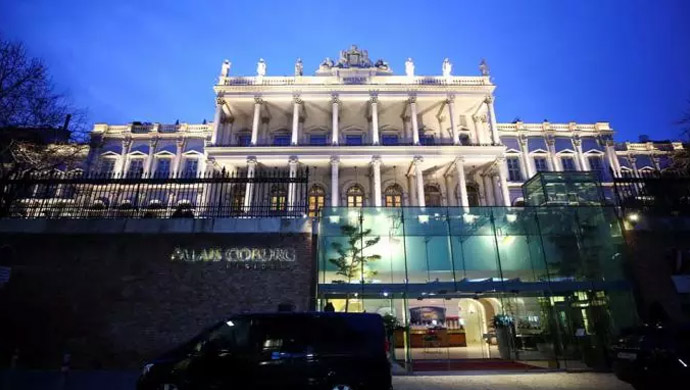After a five-month hiatus, a delegation from the Iranian regime returned to Vienna to resume talks over its nuclear program representatives from the UK, France, Germany, China, Russia, and the European Union. The United States is also taking part in the talks indirectly.
This is the first set of nuclear negotiations being led by the government of Ebrahim Raisi. Even before the talks started, Iranian officials have been setting very strict conditions, including the lifting of all sanctions imposed on the regime after the 2015 nuclear deal, including non-nuclear sanctions related to the regime’s human rights abuses and terrorist activities.
In first day of talks, the regime’s chief negotiator, Ali Bagheri Kani, reiterated the demand for the lifting of sanctions and also demanded guarantees that the U.S. and its allies do not impose any sanctions on the regime in the future. Bagheri Kani also threatened that Tehran will escalate its nuclear program if its demands are not met.
The regime’s stance in the past months has raised worries among Western officials that Tehran is playing for time and is using the talks as a cover to continue its nuclear program.
“If [Tehran] doesn’t want to get back into the deal, if it continues to do what it appears to be doing now, which is to drag its feet at the nuclear diplomatic table and accelerate its pace when it comes to its nuclear program, if that’s the path it chooses, we’ll have to respond accordingly,” U.S. chief negotiator Robert Malley said before the talks.
Rafael Grossi, the Director General of the International Atomic Energy Agency (IAEA), expressed concern about the progress of Iran’s nuclear program last week after visiting Tehran in a last-ditch effort to address outstanding issues before the Vienna talks.
Grossi described the trip as “inconclusive” and told reporters, “In terms of the substance… we were not able to make progress.”
The IAEA has been trying for months to restore its monitoring capacity in a nuclear site in Karaj. It is also seeking explanations on traces of enriched uranium found in undeclared sites in Iran. Tehran has refused to grant IAEA inspectors access to the Karaj TESA site and demands the UN nuclear watchdog to drop its concerns about the discovered uranium traces.
After months of tensions, Iran’s regime has proven that it has no intention to negotiate in good faith on its nuclear program. Tehran has been speeding it uranium enrichment program, has breached all limits imposed by the Joint Comprehensive Plan of Actions (JCPOA), and is closing in on acquiring enough fissile material for an atomic bomb.
Dignitaries and politicians from different countries are warning about the threats posed by the Iranian regime and the consequences of giving the regime concessions on its nuclear program.
At first glance, Tehran seems to be exuding power by setting maximalist conditions and refusing to back down on its demands. But like all bullies, behind the façade of power is a regime that is barely maintaining its balance on shaky foundations.
The regime is faced with an increasingly outraged population who are protesting every day for their most basic needs, including food, water, electricity, employment, unpaid salaries, rising inflation, and healthcare?
Just last week, peaceful sit-in by farmers in Isfahan turned into political protests when security forces cracked down on the demonstrations. The protesters, who have received nothing but hollow and unmet promises by government officials, resisted the regime’s repressive forces and chanted anti-regime slogans such as “Down with the dictator” and “Down with Khamenei,” calling for the overthrow of the mullahs’ regime.
The regime could address the country’s economic problems if it would dismantle its nuclear program, which has proven to have zero benefits for the Iranian people. Such a move would prove that Tehran is committed to international peace and security and would pave the way for international trade with Iran, which would lead to economic growth. Moreover, if the regime stops its terrorist meddling in the countries of the region, it could save billions of dollars every year, all of which could be spent on rebuilding Iran’s economy.
So, the question is, why is the regime digging in its heels on its nuclear program and other nefarious activities, even as it sees that its own actions are driving the country into economic bankruptcy?
The reality is that this regime has preserved its rule through terrorism, violence, and chaos. It sees a nuclear deterrent as a means for its survival. Terrorism is the only way it manages to hold its status in the region. And domestic repression is the only way it has managed to keep the outraged population of Iran in check. The regime’s own officials are warning that backing down on the nuclear issue will lead to a series of retreats in all other areas that the regime is posing a threat to the world and its own people.
At this point, the regime is in a deadlock. On the one hand, showing any sign of weakness in the nuclear talks will lead to it losing its hold on power at home, which will unleash the wrath of the Iranian people, who have been calling for regime change for years. On the other, if it continues its provocative measures, it will set itself on an inevitable collision course with the international community, bring more economic duress, and again face off with the outraged people of Iran who no longer have anything to lose. Four decades of crime, deceit, and corruption are fast catching up with the regime.





